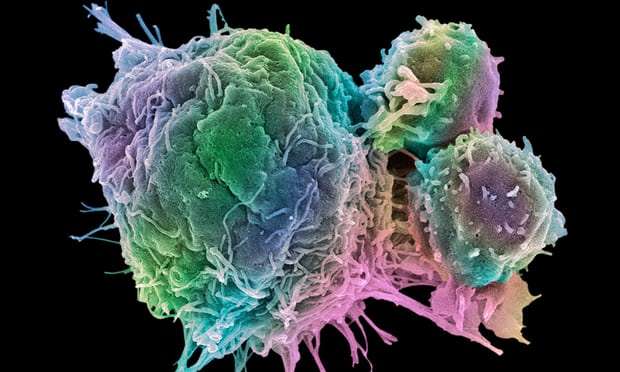Francis Crick Institute scientists developed a way of analysing a cancer's history to predict its future.
The study on kidney cancer patients showed some tumours were "born to be bad" while others never became aggressive and may not need treating.
Cancer Research UK says the study could help patients get the best care.
"We don't really have tools to differentiate between those that need treatment and those that can be observed," said researcher and cancer doctor Samra Turajlic.
One cancer could kill quickly while a patient with a seemingly identical cancer could live for decades after treatment.
It means uncertainty for both the patient and the doctor.
Kidney cancer
It is most common in people in their 60s and 70s. Symptoms include:
- Blood in your pee
- Persistent pain in the lower back or side
- Sometimes a lump or swelling in your side
The work, published in three papers in the journal Cell, analysed kidney cancers in 100 patients.
The team at the Crick performed a sophisticated feat of genetics to work out the cancer's history.
It works like a paternity or ancestry test on steroids.
As cancers grow and evolve, they become more mutated and, eventually, different parts of the tumour start to mutate in different ways.
Researchers take dozens of samples from different parts of the same tumour and then work out how closely related they are.
It allows scientists to piece together the evolutionary history of the whole tumour.
"That also tells us where the tumour might be heading as well," said Dr Turajlic.
Chance to change care
The researchers were able to classify kidney cancer into one of three broad categories:
- Born to be bad
- Benign
- Intermediate
The "born to be bad" tumours had rapid and extensive mutations and would grow so quickly they are likely to have spread round the body before they are even detected.
Surgery to remove the original tumour may delay the use of drugs that can slow the disease.
The benign tumours are at the complete opposite and are likely to grow so slowly they may never be a problem to patients and could just be monitored.
The intermediate tumours were likely to initially spread to just one other location in the body and could be treated with surgery.
Image copyrightMICHAEL MALLEY
Michael Malley, 72, from London, took part in the trial at the Royal Marsden Hospital after being diagnosed with kidney cancer.
He said: "Clearly studies like these are really important for understanding how kidney cancer evolves over time, and I hope this one day leads to better treatments for patients like me."
There is still the challenge of figuring out how best to tailor treatments to each tumour type, and even how to perform such tests in a hospital rather than a research lab.
The tools used in this study are being investigated in other cancers, including lung cancer.
Dr Turajlic says: "We've no doubt they will be applicable to other types of cancer."
The studies also revealed that the earliest mutations that lead to kidney cancer were happening up to half a century before the cancer was detected.
Sir Harpal Kumar, the chief executive of Cancer Research UK, said the study was "groundbreaking".
He added: "For years we've grappled with the fact that patients with seemingly very similar diagnoses nevertheless have very different outcomes.
"We're learning from the history of these tumours to better predict the future.
"This is profoundly important because hopefully we can predict the path a cancer will take for each individual patient and that will drive us towards more personalised treatment."
More about: cancer
















































